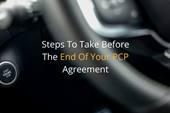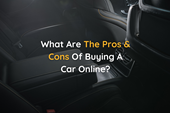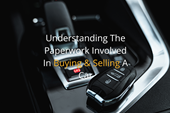
Should I Trade In Or Sell My Car Privately?
Torn Between Trade In Or A Private Sale? Read On…
Quick Links
- Introduction
- What Does Trading In Actually Mean?
- What Happens When You Trade In Your Car?
- Should I Trade In Or Sell My Car Privately?
- Pros Of Trading In Your Car
- Cons Of Trading In Your Car
- Pros Of Selling Privately
- Cons Of Selling Privately
- What About Online Car Buyers?
- When Might A Trade-In Be The Smarter Choice?
- When Is It Worth Selling Privately?
- Final Thoughts
Introduction
If you’re in the market for a new car, you’ll eventually reach the inevitable roadblock: what to do with your current car?
Trading in at a dealership or going solo and selling it yourself can both bear fruit, but which option is the best? In this article, we’re examining the pros and cons of part-exchanging and selling privately, so you can make the right decision for you.
First, though, let’s take a look at some of the basics:
What Does “Trading In” Actually Mean?
When you trade your car in, you’re essentially handing it over to a dealership or garage as part payment for your next car. It’s fast, convenient, and lets you kill two birds with one stone: offloading your old car and freeing up cash towards the next.
But convenience often comes with a catch, usually, the price.
What Happens When You Trade In Your Car?
Trading in your car with a dealership involves a fairly simple inspection, assessing its condition, identifying any damage and checking how it runs.
Once this is done, the dealership will calculate a price for your car, usually based on a ‘trade price’. Often, the trade price will be much lower than the amount you could get selling privately, but the process is much simpler. The dealership will take the car off your hands prior to you picking up your new one.
Most dealerships use tools like Glass Guide to value their cars, which provides uniformity across the market. Sadly, that means the offer you get at one dealership will be pretty much the same across the board.
If your car is in excellent condition, you may hear it referred to as ‘CAP Clean’. Essentially, that means it’s pretty much ready for resale.
Read more: Thinking of selling or trading in? Read How To Improve Your Car Resale Value
Should I Trade In Or Sell My Car Privately?
Trading In: The Easy Option?
Let’s start with trading in, or ‘part-exchanging’ as it’s also known. With 3.2 million car owners choosing this option each year, you’re in good hands, but is it right for you? Let’s take a look at the pros and cons:

Despite the changing market, part exchanging is as popular as ever.
Pros Of Trading In Your Car
- It’s fast: In most cases, dealerships can buy your car the same day. If not, it’s at least completed during the purchase process for your new car. Drive in with your old one, leave with a new one. Simple.
- It’s hassle-free: Aside from the initial inspection by the dealership, which, in all honesty, is pretty laid back, you’ll not have much more stress. There’s no need to run ads, deal with multiple ‘buyers’ or undergo in-depth scrutiny of your car.
- There’s less paperwork: When you trade in your car, the dealership will deal with DVLA forms, V5C and logbooks, so you don’t need to worry.
- It can help in your next deal: Not always, but in some cases, part-exchanging can open up incentives, such as bonus deposit contributions on your next car.
Cons Of Trading In Your Car
- You’ll probably get less money: Dealers need to make a margin when they resell your car, which means they’ll ultimately need to pay you less than the car would be worth when sold on. As we’ve covered, you’ll most likely be offered a ‘trade price’, which is the going rate for dealerships to make some money down the line.
- You might not get ‘cash’: Not all trade-in offers are as transparent as they should be. You need to be clear whether you’re being offered an outright amount for your car or if the amount is being absorbed by financing.
As you can see, trading in with a dealership does deliver on ease, but the main (possibly only) drawback is money.
Read more: If you’re considering part exchanging, why not perfect the whole process with The Only Car Buying Guide You’ll Ever Need?
Selling Privately: More Work, More Reward?
Now we’ve looked at part-exchanging, let’s talk about private selling. If you’re willing to roll up your sleeves and get stuck in, it’s often the route that brings in more cash.
These days, you’ll need to use at least one digital platform to sell your car, whether that’s Gumtree, Facebook Marketplace or the big one, Autotrader.
Whichever you choose, you’ll list your car with a description and photos (good photos can even increase your sale price, so they’re worth taking time over), then deal with buyers directly; ultimately, it’s more time and effort, but you have more control over the final price.
Pros Of Selling Privately
- More money in your pocket: Although it’s up for debate, you could earn more selling your car privately.
- Set your price: You call the shots, not a dealership trying to maximise its margin.
- Room for negotiation: If you're comfortable negotiating, you might do well with serious buyers.
- You’re in control: You manage the car-selling process, so you can determine when and how your car is sold.
Cons Of Selling Privately
- It’s time-consuming: Photos, listings, viewings and test drives all add up.
- You’ll deal with strangers: It’s not always a big deal, but it’s worth knowing. You’ll need to vet potential buyers and be smart about safety.
- No guarantees: It might take days or even weeks to sell. Worst still, you might get time-wasters who just want to kick tyres.
Read more: selling privately? Here’s How To Sell Your Used Car
What About Online Car Buyers?
We’ve all seen the adverts to get a quote in 30 seconds and sell your car instantly using car buying services, but are they any good?
Car buying services sit somewhere between trade-ins and private selling. Easier than going alone, but usually not as lucrative as selling privately. Some find the convenience handy, but others find the final offer is a lot lower than the online quote.
As well as this, a study by Autotrader found that selling via one of these car buying companies resulted in an average sale that was £958 lower than selling privately.
And, without being too harsh on them, it’s worth also pointing out that ‘cash buyers get a better price on their next car’ is a complete myth. Many car buying services lead with this, giving you the impression that you’re better off trading in with them, to use ‘cash’ against your new car, rather than trading in with a dealership directly.
You aren’t.
These days, dealerships don’t ‘prefer’ cash buyers; many have finance deposit contributions and other offers designed to get you to actually move away from cash. Cash buyers, in dealer terms, are more hassle, have lower profit and have a much shorter life cycle.
So, what are car-buying services good for?
Well, don’t write them off just yet. We can see the value in a car buying service if you’re looking to sell, whilst not necessarily buying another car, but preferring ease over value.
If you want a quick, hassle-free sale and don’t mind losing a few pounds off the final price, these services could be for you.
When Might A Trade-In Be the Smarter Choice?
Trading in your car is most likely the preferred option, especially if you’re looking for another vehicle and you’ve decided to visit a showroom. In all honesty, it’s a part of the process, so it’s pretty hard not to get sucked in at the dealership.
That’s not a bad thing. We think a trade-in is the smarter choice if you don’t fancy dealing with buyers, setting up ads or making sure paperwork is complete.
What’s more, when you think about the speed of trading in, compared to selling privately (plus, you’d need to fork out for advertising costs upfront), then a part exchange quickly becomes a good option.
Another thing to consider too, if you’re car has some damage you don’t want to get involved with repairing, trading in can be the way to go, as the dealership, whilst knocking off a few pounds, will handle the repairs.
What If My Car Has Outstanding Finance?
Most dealerships will handle the existing finance for you, provided your car isn’t in negative equity, where the amount you owe is greater than the car’s current value.
And When Is It Worth Selling Privately?
Selling privately is a great option if you have time and willpower, especially if your car is rare, in good condition or has low mileage, where you might eek out more money from the sale.
If you’re comfortable with test drives, viewings and managing paperwork, not to mention being comfortable at negotiation, then selling privately could be for you.
It’s also a great way to maintain control through the selling process.
Final Thoughts
As you’ve probably guessed by now, whether you trade in or sell privately depends upon your priorities.
If time and convenience top your list, a trade-in is hard to beat, but if squeezing out the most value matters more, a private sale can pay dividends.
Neither option is wrong. It’s just about what feels right for you, your car and your schedule. Don’t rush your decision; a little planning now could mean more money (or less stress) later on.
Either way, remember to prep your car as best you can, whether for a sale or a part exchange inspection.
If you’re still unsure which route to take, try getting a few quotes, either from dealership websites or online car buying sites, then compare them to the going rate for private sales in your area. That alone could make the choice clear.
We hope you’ve enjoyed reading this article and we hope it’s given you some answers, plus more food for thought. If there’s anything we’ve missed, feel free to message us on social media with your questions; we’re always happy to help.
Pin It!













